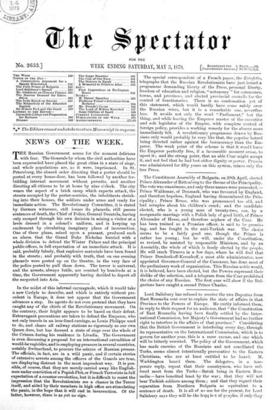The special correspondent of a French paper, the Estafette, telegraphs
that the Russian Revolutionists have just issued a programme demanding liberty of the Press, personal liberty, freedom of education and religion, " autonomy " for communes, towns, and provinces, and elected provincial councils for the control of functionaries. There is no confirmation yet of this statement, which would hardly have conic safely over the Russian wires, but it is a remarkable one, neverthe- less. It avoids not only the word "Parliament," but the thing, and while leaving the Emperor master of the executive and sole legislator of the Empire, with complete control of foreign policy, provides a working remedy for the abuses more immediately felt. A revolutionary programme drawn by Rus- sians only would probably be very like that, the popular hatred being directed rather against the bureaucracy than the Em- peror. The weak point of the scheme is that it would leave the Emperor perfectly free, if a favourable moment arose, to upset it; and the strong point, that an able Czar might accept it, and not feel that he had lost either dignity or power. Prussia was administered for fifty years on this system, minus only the free Press.


































